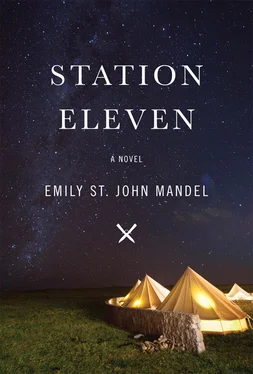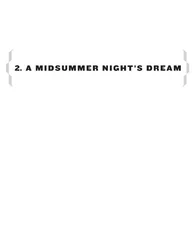The moon was a crescent in the evening sky. He walked as quietly as possible, the pack weighing on him with every step. He avoided the roads as much as he could. The lake to his left, black water gleaming. The beach was pale in the half-light. Impossible not to think of Frank, lying still on the bed with an empty bottle of sleeping pills on the nightstand, but he couldn’t dwell on Frank because every sound might mean the end of everything, every shadow could be hiding someone with a gun who wanted his backpack. He felt his senses sharpening, an absolute focus taking hold. This is what it would take.
There was something out on the lake, a white shape bobbing. A sailboat, he decided, probably the same one he’d seen weeks ago from the apartment, probably no one aboard. He kept walking and the city kept pulling him away from the lake. He climbed embankments and followed lakeside streets until he could return to the water, until finally the city fell away. Every so often he stopped to listen, but heard only the water on the gravel beach, a gentle wind.
After some hours, he heard gunshots, far distant, two quick sharp noises and then the night closed over the sounds and there was only Jeevan, only the water, only whatever frightened souls still remained. He wished he could move faster.
The moon was setting. He was passing along the edge of an industrial wasteland. It occurred to him that he was very tired, and also that it would be dangerous to fall asleep. He somehow hadn’t thought much about what it would be like to sleep out here, unprotected. He was cold. He could no longer feel his toes, or his tongue either, because he’d been putting snow in his mouth to stay hydrated. He placed a pinch of snow on his tongue and thought of making snow ice cream with Frank and their mother when they were small boys—“First you stir in the vanilla”—Frank standing on a stool on his wondrously functional pre-Libya legs, the bullet that would sever his spinal cord still twenty-five years away but already approaching: a woman giving birth to a child who will someday pull the trigger on a gun, a designer sketching the weapon or its precursor, a dictator making a decision that will spark in the fullness of time into the conflagration that Frank will go overseas to cover for Reuters, the pieces of a pattern drifting closer together.
Jeevan sat on a driftwood log to watch the sunrise. He wondered what had happened to his girlfriend. She seemed very distant. He thought of his house and wondered if he’d see it again, knew almost at the same moment that he wouldn’t. As the sky brightened he built a shelter from driftwood and the garbage bags he’d brought with him, a makeshift structure that would cut the wind and hopefully look like a pile of trash from a distance. He curled around his pack and fell into a fitful sleep.
When he woke later in the morning, there was an instant when he didn’t know where he was. He had never in his life been so cold.
He’d been walking for five days before he saw anyone else. At first the solitude was a relief — he’d imagined a lawless world, he’d imagined being robbed of his backpack and left to die without supplies a thousand times — but as the days passed, the meaning of the emptiness began to sink in. The Georgia Flu was so efficient that there was almost no one left.
But on the fifth day he saw three people far ahead on the shore and his heart leapt. They were traveling the same direction as Jeevan. He stayed a mile or so behind them all through the day. At nightfall they built a fire on the beach and he decided to risk it. They heard his footsteps and watched as he approached. He stopped twenty feet away, raised both hands to show he was unarmed, and called out a greeting, waited till one of them beckoned him close. They were two young men of nineteen or twenty and an older woman — Ben and Abdul and Jenny — tired and worn in the firelight. They’d been walking for a day longer than he had, down through the city from the northern suburbs.
“Is there a lot of crime in the city?”
“Sure,” Abdul said. He was thin and nervous, with hair down to his shoulders; he twisted a strand around his finger as he spoke. “Anarchy, right? No police. Fucking terrifying.”
“But actually not as much crime as you’d expect,” Jenny said. “There just aren’t that many people.”
“Did they leave, or they’re all …?”
“If you got sick,” Ben said, “you were gone in forty-eight hours.” He knew something about it. His girlfriend, his parents, and his two sisters had died in the first week. He couldn’t explain why he wasn’t dead too. He’d taken care of all of them, because by Day Three all the hospitals had closed. He’d dug five graves in his backyard.
“You must be immune,” Jeevan said.
“Yes.” Ben stared fixedly into the flames. “I’m the luckiest man alive, aren’t I?”
They traveled together for nearly a week, until they reached a point where Jeevan wanted to keep following the lake and the other three wanted to turn west, toward a town where Jenny’s sister had lived. They debated the matter for an hour or two, Jeevan certain that venturing into a town was a mistake and the others disagreeing with him, Jenny afraid of never seeing her sister again, and in the end they wished one another luck and parted ways. As Jeevan walked on alone he felt himself disappearing into the landscape. He was a small, insignificant thing, drifting down the shore. He had never felt so alive or so sad.
There was a clear morning some days later when he looked up and saw Toronto on the far side of the lake, ghostly with distance. A thin blue spire piercing the sky, glass city. From this distance it looked like something from a fairy tale.
He came upon other travelers sometimes, but so few. Almost everyone was moving south.
“It’s like those disaster movies,” he’d said to Frank, over two months ago now, on the third or fourth night in the apartment. Those were the days before the end of television. They were stunned with horror but it hadn’t entirely sunk in yet, any of it, and that night there was a certain awful giddiness. All evidence suggested that the center wasn’t holding — Was this actually happening? they asked one another — but personally they had food and water, they were at least momentarily secure and not sick. “You know,” Jeevan had said, “in the movie version of this there’s the apocalypse, and then afterward—”
“What makes you think we’ll make it to afterward?” Frank was always so goddamned calm about everything.
This silent landscape. Snow and stopped cars with terrible things in them. Stepping over corpses. The road seemed dangerous. Jeevan avoided it, stayed mostly in the woods. The road was all travelers walking with shell-shocked expressions, children wearing blankets over their coats, people getting killed for the contents of their backpacks, hungry dogs. He heard gunshots in the towns so he avoided these too. He slipped in and out of country houses, searching for canned goods while the occupants lay dead upstairs.
It was becoming more difficult to hold on to himself. He tried to keep up a litany of biographical facts as he walked, trying to anchor himself to this life, to this earth. My name is Jeevan Chaudhary. I was a photographer and then I was going to be a paramedic. My parents were George of Ottawa and Amala of Hyderabad. I was born in the Toronto suburbs. I had a house on Winchester Street. But these thoughts broke apart in his head and were replaced by strange fragments: This is my soul and the world unwinding, this is my heart in the still winter air. Finally whispering the same two words over and over: “Keep walking. Keep walking. Keep walking.” He looked up and met the eyes of an owl, watching him from a snow-laden branch.
Читать дальше












